Streets for People / Serious Bikeshare in the U.S.A. is 11 Years Old. Its Success Shows Cities Can Do Innovative Work
Today we’re reprising an article we brought our readers in a different venue a year ago. The story has relevance to us here in my hometown of Key West and other cities for several reasons:
- Bikeshare and now e-scooters or micromobility, as they are commonly called together, are changing the way we move about our cities for the better. They are efficient, clean-powered and healthy. They help us reclaim space from cars and repurpose it for people.
- The back story of the country’s first major bikeshare program shows that local governments, working cooperatively with each other and the private sector, can make our cities better places.
- The success and replication of this program, Capital Bikeshare, shows that local governments with the guts and leadership to try new things win the future.
My hometown of Key West, maybe like your hometown too, is full of wonderful people and good ideas that would make our community’s future better. We have ideas for pedestrianizing more of our downtown streets, revamping our public transit system, and making it safer and easier to bike and walk. Yet time after time, ideas are quashed by naysayers, NIMBYS, whataboutism and moneyed special interests. Projects that do get going wither on the vine from inattention, turnover, budget constraints and incompetence. It is a wonder we get anything new done. And yet…
And yet, we have the example of Capital Bikeshare. A program pushed forward by multiple local governments that included funding from private sources, local, State and Federal funds. A program that showed, YES, government can still do good things. I ask you to read this story with that in mind. Then apply the lessons learned here and in my good friend Gabe Klein‘s awesome book Start-Up City and go out and do good things. Enjoy…
Capital Bikeshare is 10 Years Old. Its Success Hinged on Pioneers Working Together.
By Chris Hamilton, September 13, 2020
In just 10 short years bikeshare has changed the way we move about our cities. Here’s a little more back story on the pioneers who worked together to transform transportation in North America.
September 20, 2020, marks the 10th Anniversary of Capital Bikeshare, the first successful, large-scale bikeshare program in the U.S.A. After a decade of growth, a system that began with 400 bicycles at 49 stations now has nearly 5,000 bikes at almost 600 stations in 3 states. More impressive is that the massive success of CaBi, as it is affectionately known, sparked a movement that now sees similar bikeshare operations in 120+ cities across North America. 10 years later Capital Bikeshare is still one of the top systems having been named North America’s best just a few months ago (Six Best Bikeshare Systems in the U.S. and Canada, Money Crashers, June 20, 2020).
Bikeshare, along with the micro-mobility devices that followed it, have in a very short time, revolutionized the way we get around our cities. If not for the daring and teamwork of some pioneers in the D.C. region, who knows how long it may have taken to prove the feasibility of this idea and catch on the way it did. The best systems have become such a staple of everyday living that one can’t even imagine the Washington, D.C. region or the cities of New York or Chicago today without their respective bikeshare.
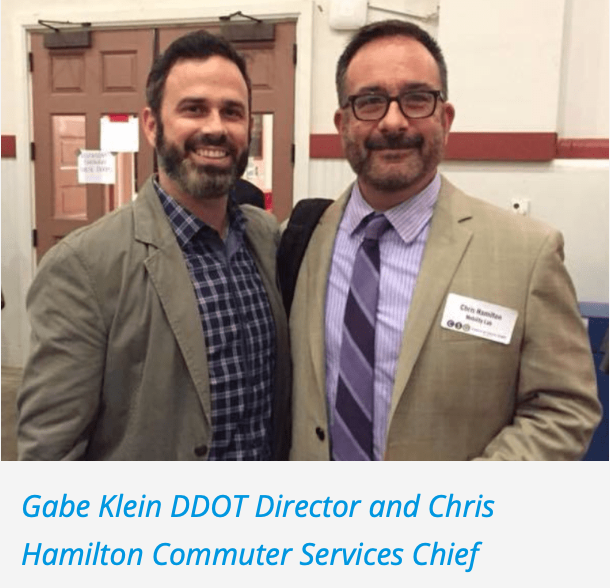
Two Innovative DOTs Took a Leap of Faith on the Concept
What’s remarkable is that a couple of local government entities, the District of Columbia and Virginia Departments of Transportation, jointly took a leap of faith, launched and then quickly expanded a unified system without the usual and laborious bureaucracy and proof of concept planning that precedes most government projects. As a result, the agencies hit the ground running, met immediate acclaim, and that success fueled further growth. It was only once Capital Bikeshare was firmly established as an ongoing concern, a couple years into the project, that the DOTs took a breath and generated “transit development plans” or TDPs that covered long-term planning, expansion and financing that cements the system as a permanent part of the region’s transportation infrastructure.
DDOT Mirrored Its Chief, Acted Like a Start-up and Pushed the Project Over the Finish Line
It was a perfect storm of people and opportunities that made it all come together. The District had tried a small 10-station bikeshare project called SmartBikeDC that generated early adopter fans. D.C.’s progressive mayor, Adrian Fenty, hired for his District Department of Transportation (DDOT) Chief an unconventional, entrepreneurial, start-up guy in Zipcar executive Gabe Klein who knew how to get stuff done quickly. Mr. Klein assembled an amazing team of like-minded people who ensured the eventual Capital Bikeshare project felt more like a private start-up than a government run project. Once Gabe decided to abandon SmartBikeDC’s operator Clear Channel Outdoor and join with Arlington’s bikeshare procurement, he and his people made the CaBi project blossom and pushed it over the finish line.
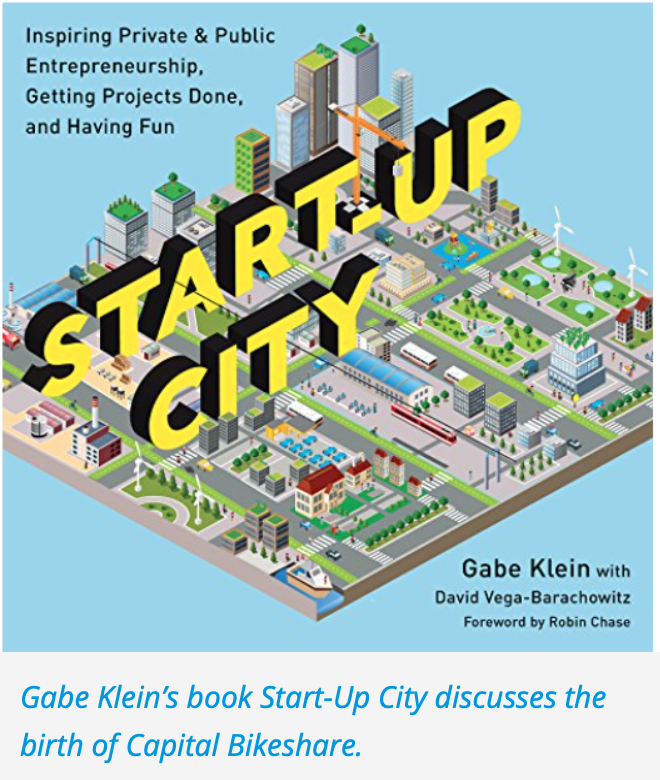
Gabe’s team included true believers like Jim Sebastian and Chris Holben, who did all the planning under the direction of their their boss Karina Ricks. Alice Kelley, Scott Kubly, John Lisle, Karen Le Blanc, and others were part of Gabe’s brain trust. Gabe and a host of others at DDOT ensured success. This story is well chronicled in Gabe’s awesome book, Start-Up City (our review of the book), on Wikipedia and in a number of articles that appeared in the news within a few years of the launch (Many Unsung Heros Made Capital Bikeshare a Reality, by Dave Alpert, Greater Greater Washington, 1/9/13; The Best Bikesharing Program in the United States – How D.C. of all places, made it happen. by Tom Vanderbilt, Slate.com, 1/7/13.)
But a lesser known subplot of the story had developed concurrent with the District’s efforts on the other side of the Potomac. For Capital Bikeshare’s launch to actually happen on September 20, 2010, this story had to advance over the course of a few years on both sides of the Potomac before coming together. Without this set of circumstances serendipitously happening, just this way, bikeshare as we have come to know it, may not exist.
Arlington Commuter Services Entrepreneurial Spirit Gave Life to an Idea and Wouldn’t Give Up in the Face of Bureaucracy
Across the river in Arlington County, the Arlington DOT had a successful entrepreneurial Bureau (Commuter Services) that for more than a decade had been using top of the industry private contractors to pioneer groundbreaking retail (The Commuter Store), business to business (Arlington Transportation Partners), community outreach (BikeArlington and WalkArlington), internet (CommuterPage.com, CommuterDirect.com and more), marketing (Arlington’s Car-Free Diet) and research services (Mobility Lab) that relied on an intricate maze of outside grants and self-generated funding. It’s accolades and success (A Dozen Easy Principals for Organizational Success), allowed it to act autonomously enough to bypass some of the usual bureaucracy to bring new projects to market. That included Capital Bikeshare. The management part of that team included: Lois DeMeester, Bobbi Greenberg, Jay Freschi, Chris Eatough, John Durham and Howard Jennings.
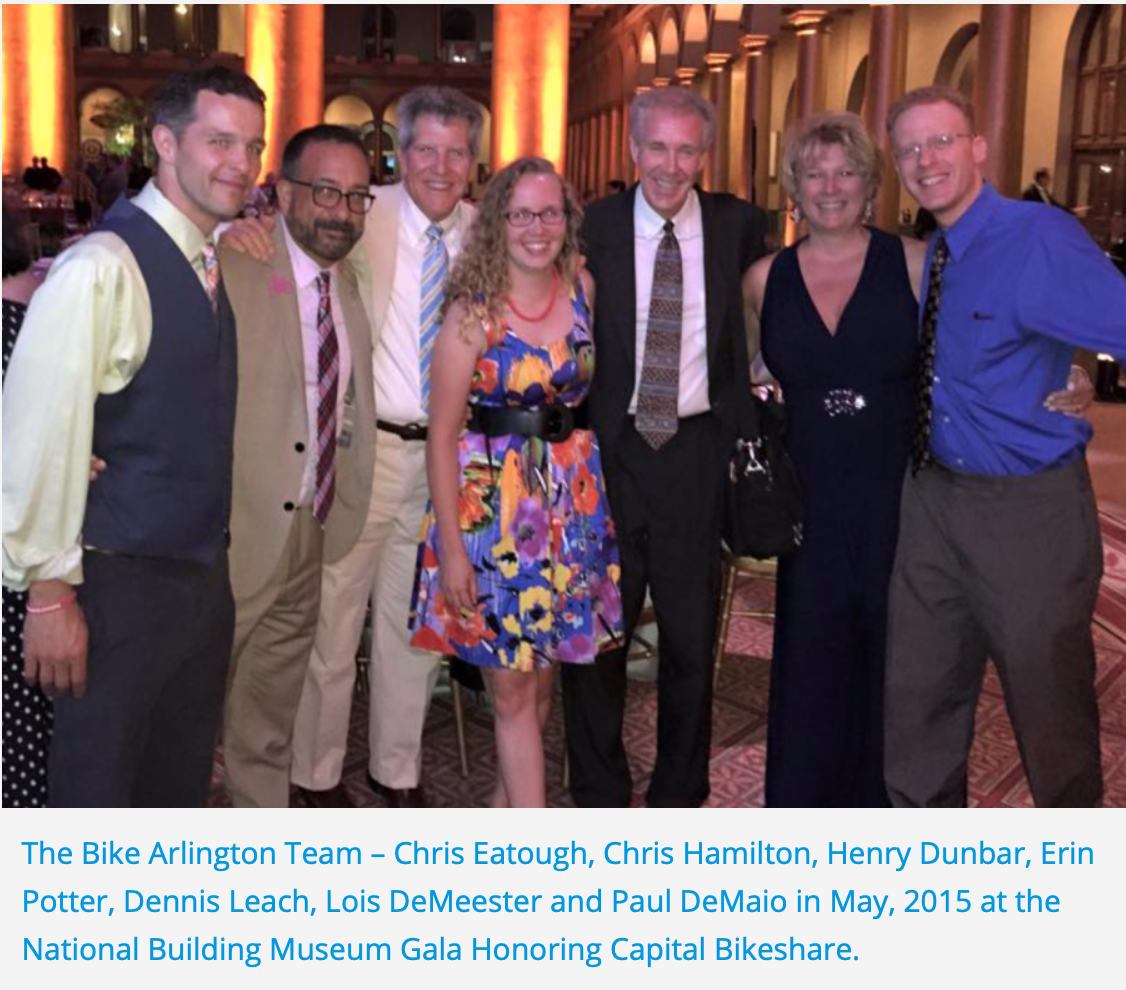
It started with this team, whose mission was to “make it easy” to use transit, bike, walk and share the ride, believing in the idea and dream of one of its younger team members, Paul DeMaio. Paul traveled to Europe and brought back stories of nascent bikeshare projects in Germany (Call-a-Bike comes to mind). He painted such a vivid picture of solving first and last mile transportation issues at one of the team’s annual strategic planning meetings, that everyone encouraged Paul to write a proposal for the unit to submit a grant for State “experimental” transportation funding. When it wasn’t funded the first year, it was resubmitted again and got funded a year later. Paul was then tasked to lead the Arlington effort and the entire bureau committed to making the project happen. Something this different would take a multi-disciplinary and entrepreneurial team to bring it to life. Luckily, in Commuter Services, bikeshare found life.
Once seed funding was found via the State grant, the Crystal City Business Improvement District’s insightful leaders (Angie Fox and Rob Mandle) volunteered to match the State money if the County would agree to start the project in Crystal City. In fact, concentrating on one specific neighborhood helped the project. Then DOT Director, avid bicyclist and annual European bike trip traveler Dennis Leach, who protected and nurtured Commuter Services’ vision from the rest of the bureaucracy, came up with half of the initial funding by matching the state grant and BID monies.
With money in hand and the realization that the project couldn’t be done with County staff (too many hoops to ramp up), the team turned to look for a contractor to operate the system. The idea was modeled after the County’s ART bus system, where Arlington owned the buses but hired a private company to manage and operate the system. The County was also responsible for all marketing and public relations for ART. Commuter Services just happened to already be the unit that did the ART bus marketing, so this model was envisioned to work similarly for bikeshare. The County would own the equipment, hire an operator and keep the marketing and public/community relations in-house.
The Commuter Services team didn’t think of bikeshare as just biking or a novelty but rather as an extension of the transit system and as a serious addition to the transportation service mix offered by the County. This philosophy undergirded everything and was a large part in how needed people, throughout the government hierarchy who were pre-disposed to not spend money or take on new projects, were brought into the fold. Arlington already had a reputation for “smart growth” and getting people to use transit. If bikeshare was seen as part of that, then it didn’t seem so foreign. This strategy was crucial in gaining acceptance. (Read: Cities Must Understand Bikeshare Is Transit)
Using the ART bus operation as a framework, County Attorney Bruce Kimble and Purchasing Agent Maryam Zahorylikely spent 100 hours (volunteering nights with Commuter Services) to draw up a never-before-been-done Request for Proposals (RFP) and then a contract for the unproven concept. Thousands of municipalities had contracts for bus systems. But THIS kind of bike transit system had never been tried before. Their painstakingly meticulous and pioneering work eventually paved the way for other cities across the U.S.A. (the RFP and contract was widely shared) to put out similar contracts for service, spurring bikeshare across the continent.
Regional Cooperation Wins Out
By now our story has taken a couple years just to get to this point. Having heard that the District was having problems with Clear Channel and thus might need a Plan B, the team ensured the RFP and contract allowed for other local jurisdictions in the Metropolitan Washington Council of Governments to “ride” or piggyback Arlington’s contract without having to go through their own entire procurement process to purchase their own set of bikes and stations and thus create a regional system. District of Columbia, City of Alexandria, VA and Montgomery County, MD staff were asked to sit on the RFP selection panel as a result. After months of work, the group selected Alta Bicycle Share, a company that was set up specifically for this project by Alta Planning & Design from Portland, OR. This spin off company was later acquired by Motivate.
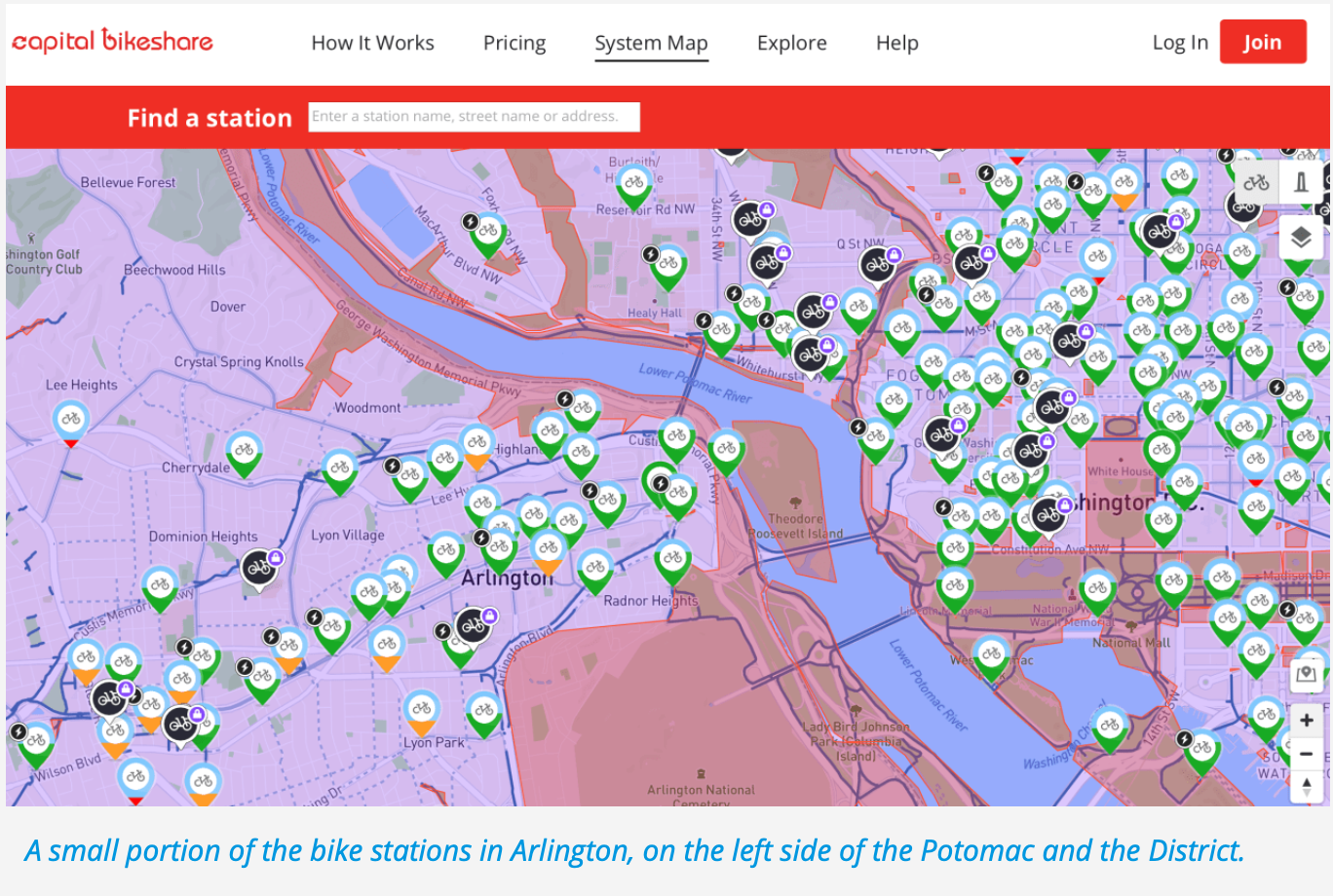
Even as a vendor was being selected, the District was still holding out hope with their talks to use SmartBikeDC vendor Clear Channel Outdoor. A couple forward thinking, smart-growth champions, County Board Members Chris Zimmermanand Jay Fisette, insisted on a regional approach and didn’t want Commuter Services staff to move forward differently from D.C. They initiated a meeting with DDOT’s Gabe Klein and Arlington staff.
It helped that a number of influential local bloggers at Greater Greater Washington, TheWashCycle and Beyond D.C., among others, cheered for bikeshare in the region and also insisted that different systems on either side of the Potomac made no sense. It aided the cause that the Alta Bicycle Share vendor proposed using the amazing Montreal Bixi system bikes. The solar-powered system didn’t need to be hard-wired like SmartBikeDC and the bikes were much more sturdy. After the meeting, the Clear Channel route was abandoned by the District and Arlington and D.C. staff moved forward together on a unified project.
Two DOT’s Working Together With a Shared Belief in an Idea and in Each Other
Although both agencies were using the same contract to work with Alta Bicycle Share to create a brand new bikeshare system, there was no formal compact, memorandum of understanding, or agreement between the DOTs on who did what and how they’d manage that system. The District and Arlington owned their own respective equipment (the stations and bikes – although the bikes could cross jurisdictional lines), shared managing the vendor and were responsible for all marketing and PR. The people involved, on both sides of the Potomac had a shared belief in the project.
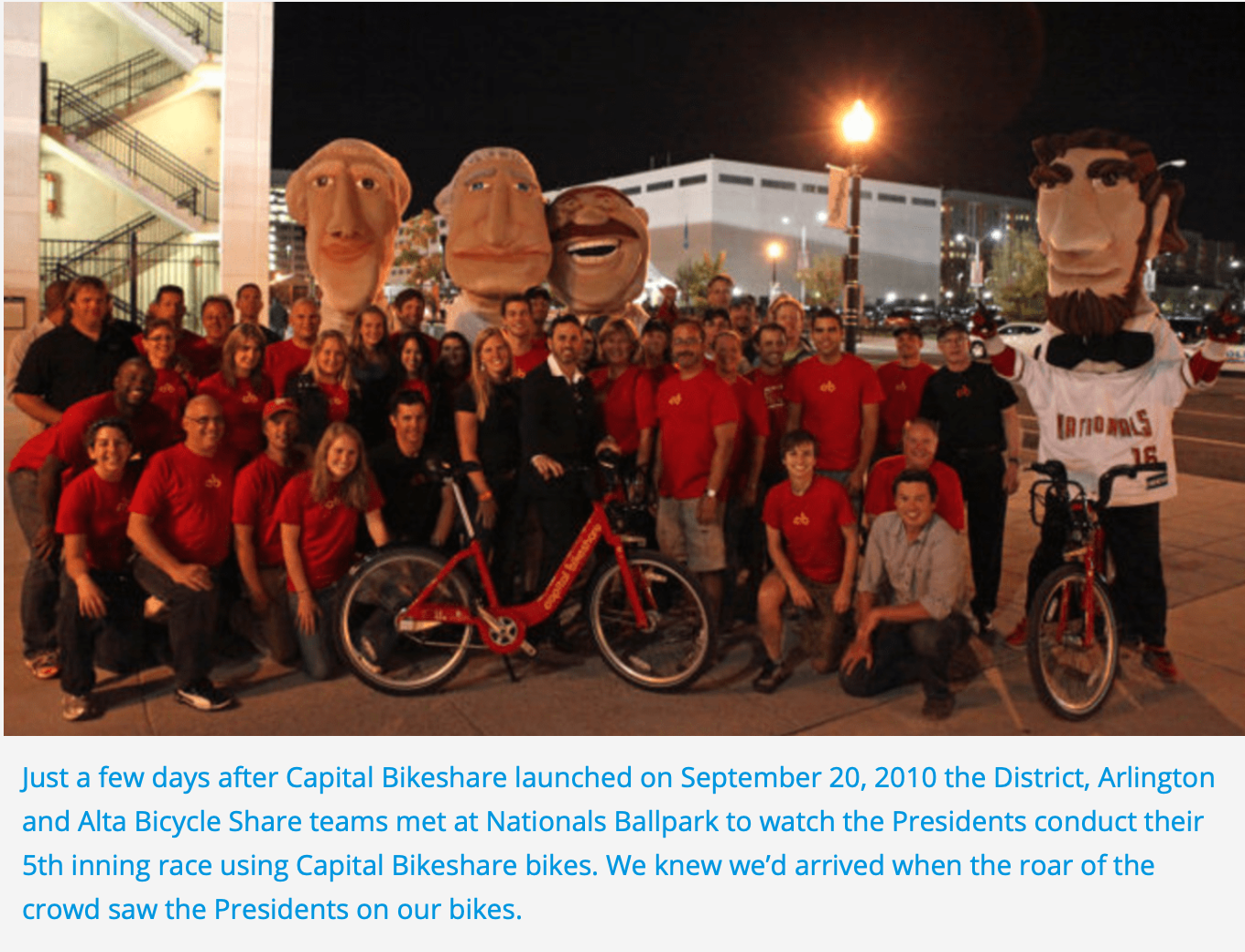
Everyone respected the respective strengths each brought to the table and trusted each other to have the best interests of the whole at heart. That faith in the idea and each other fueled the project. Another common bond between the District and Arlington teams was respect for the vendor Alta Bicycle Share, who brought an amazingly strong team of their own to the project (Alison Cohen and Charlie Denney among them). Too often government entities treat contractors at arms length or worse, like serfs. But Mr. Klein’s background in the private sector and Commuter Services experience using private contractors elevated the endeavor to a true partnership between all three entities. It clicked. And the results were fun and amazing.
This is how Alison Cohen put it in a 2013 interview:
“From the agency side, the team that I worked with from DDOT and Arlington was so professional and incredible, the real thought that I had was “don’t mess up”. During that first launch, there was a lot of learning between Alta, PBSC and the clients, and we ended up working all together to make sure that everything was covered. We at Alta ended up being in the middle to fill in all the gaps in this first-ever bike share contract. It was a very tiring and very exciting 4 months from when we completed our contract in May 2010 to system launch in September 2010. There was such a wave of dedication from all of the staff of the agencies, all the staff that we hired, and from PBSC to ensure a successful launch.” League of American Bicyclists, June 4, 2013, Women Bike Wednesday: Alison Cohen, Bike Share Pioneer
Yes, the System Was Almost Named George
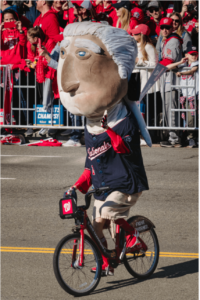 The D.C., Arlington and Alta teams worked with Arlington’s marketing firm (Alberto Gonzalez‘ Pulsar Advertising which included Jim Wright and Katherine Carlson) to come up with a name and branding. Yes, we almost called the system George, after our first president. WeCycle was another popular choice. Capital Bikeshare and CaBi won out for a variety of reasons including trademark issues and testing with the public. Pulsar had also worked with the Downtown DC BID on the branding of the D.C. Circulator bus and this would become visually evident later as Gabe Klein insightfully insisted Capital Bikeshare branding be similar to the Circulator – thus the unified red, black and gold colors.
The D.C., Arlington and Alta teams worked with Arlington’s marketing firm (Alberto Gonzalez‘ Pulsar Advertising which included Jim Wright and Katherine Carlson) to come up with a name and branding. Yes, we almost called the system George, after our first president. WeCycle was another popular choice. Capital Bikeshare and CaBi won out for a variety of reasons including trademark issues and testing with the public. Pulsar had also worked with the Downtown DC BID on the branding of the D.C. Circulator bus and this would become visually evident later as Gabe Klein insightfully insisted Capital Bikeshare branding be similar to the Circulator – thus the unified red, black and gold colors.
It further helped that the firm (Destination Sales and Marketing Group, (DS&MG) headed by the amazing entreprenaur Lois DeMeester, the District was using for its TDM marketing program, goDCgo, and would be responsible for much of the marketing and social media rollout, was the same contractor working for Arlington Commuter Services on various projects. In fact goDCgo staff (Katie Sihler headed the effort) sat next to the Bike Arlington (DS&MG) staff (Chris Eatough and Tim Kelley) responsible for Arlington’s portion of the rollout.
“Don’t Underestimate How Hard It is to Work Together to Make Something Happen”
With a contract vendor, branding and marketing teams in place, this is where Gabe’s management and communications’ team took the lead heading into the summer before the launch. It made sense as they were the most heavily invested in terms of stations and bikes after all, and so they pushed the ball over the goal line toward the September 20 launch. The rest is history.
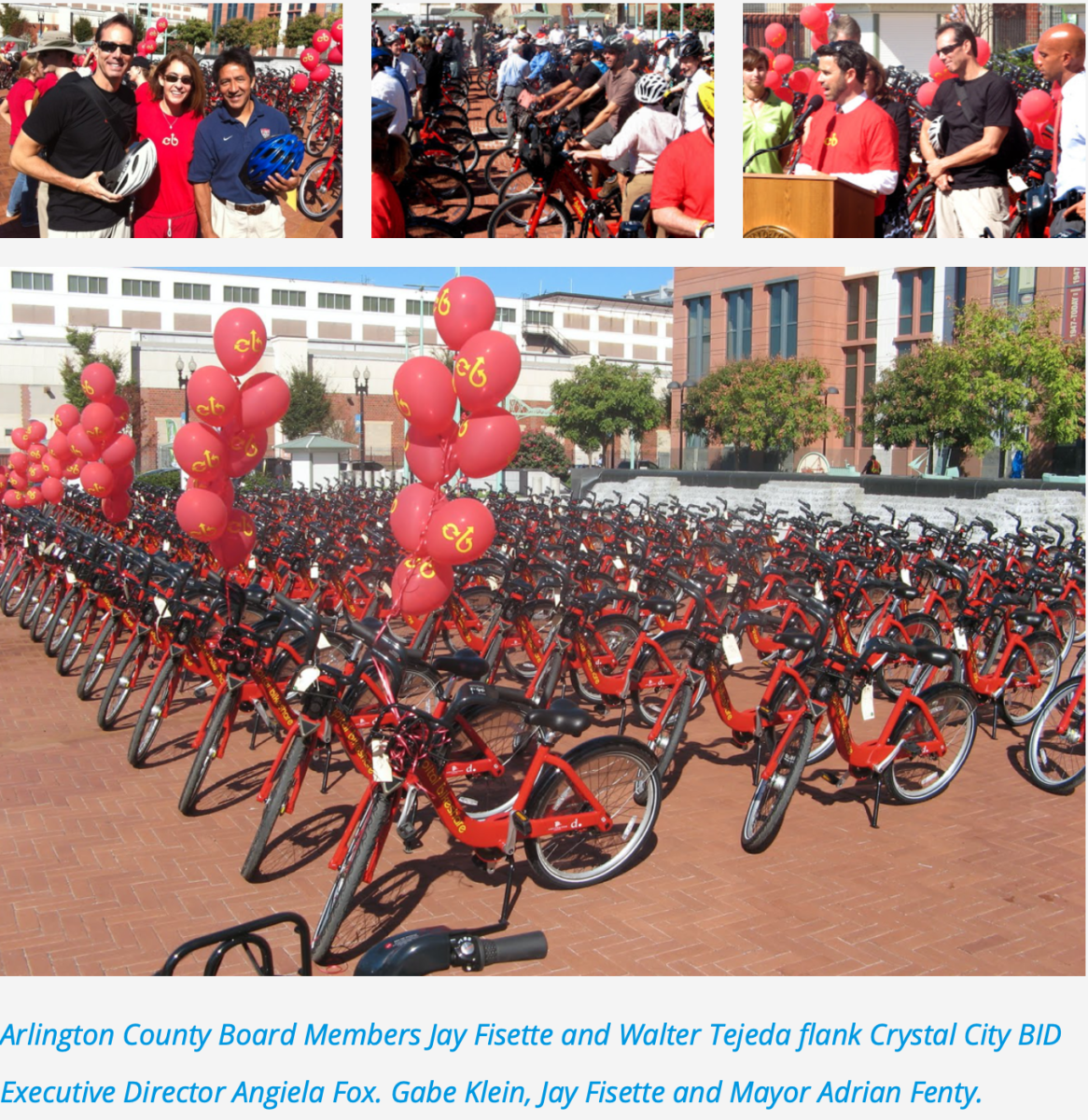
At the grand opening ceremony at the U.S. Department of Transportation, Arlington County Board Chairman Jay Fisette welcomed everyone “to the most bike friendly region in America!” He added:
“This is regional success. Don’t underestimate how hard it is for one jurisdiction to reach out to another and for two of them to work together to make something happen. And it’s only the beginning because Alexandria, Falls Church and Montgomery and Prince Georges Counties are next.”
He was right, the story of Capital Bikeshare happening may have seemed easy to the public. But the confluence of good people and goodwill and the serendipitous circumstances that had to occur to make this happen is the real untold story of CaBi. Congratulations to everyone involved, on both sides of the Potomac, in changing the region’s transportation system and showing the way towards a better future for the rest of the country. Happy 10th Anniversary!
# # #
You can find all the KONK Life Streets for People column articles here and recent stories below:
- Can We Save Key West Transit from a Death Spiral? September 3, 2021
- We Need to Increase the Quantity and Quality of Bicycle Parking Downtown; August 27, 2021
- City to Make It Easier to Bike to the Lower Keys Shuttle Bus; August 20, 2021
- It’s Time to Put an Hourly Limit on the Free On-Street Parking Spaces and Institute a Zone System for Residential Parking Permits Downtown; August 13, 2021
- We Need to Encourage Efforts Like the Proposed Lama Electric Scooter; August 6, 2021
- Uber-Like Transit Coming to Key West?; July 30, 2021
- Our Top 7 Bike, Walk, Transit and Streets for People Articles of 2021; July 24, 2021
- With the Duval Street Revitalization Plan Way Behind Schedule, Here’s 3 Quick Wins for Pedestrianizing Duval Street Now; July 16, 2021
- Limiting Large Cruise Ships Gives Us an Opportunity to Make Duval Street and Historic Downtown More Locals Focused, Again; July 9, 2021
- Mayor Bravely Puts Onus on Commission to Do Heavy Lifting on Bike, Walk and Transit. Will They Come Through?; July 2, 2021
- Monorail, Monorail, Monorail or Just Say No to Privatizing Key West Parking; June 25, 2021
- New City Manager Will Be Good for Bike, Walk, Transit and for Key West; June 18, 2021
- PeopleForBikes Ranks Key West 39th Best City for Bicycling; June 11, 2021
- First and Bertha Streets Corridor Road Improvements Are Another Missed Opportunity to Make Bicycling Safer and Easier; June 4, 2021
- Want Sidewalk Cafe’s and Other Amenities? We Need to Take Some Space from Cars; May 28, 2021
- In Quest to Improve Crosstown Greenway, City Prepares to Construct New Bike Trail Segment; May 21, 2021
- How Better Transit and Bicycle Facilities Can Help Address Affordable Housing; May 14, 2021
- City Commission Tries to Have Its Cake and Eat It Too on S. Roosevelt Blvd. – Perhaps Dooming a Safer Project; May 7, 2021
- What’s Old is New Again – Two New Bike Trails Take Us Back in Time to a Simpler Key West, April 30, 2021
- Do Key West Commercial Areas Need Business Improvement Districts (BIDS)? – Part 2: What BIDS in Key West Might Look Like, April 23, 2021
- Do Key West Commercial Areas Need Business Improvement Districts (BIDS)? – Part 1: What’s a BID?; April 16, 2021
- The Good, the Bad and the Ugly – A Dozen Marketing Things KW Transit Can Do to Increase Ridership; April 9, 2021
- The Sorry State of Key West Bus Stops – We Just Don’t Care; April 2, 2021
- It’s Time to Reconsider a Road Diet on S. Roosevelt and Make the Promenade and Road Safer; March 26, 2021
- Getting the Parking Right Leads to Streets for People – Part 2: Battling Our Inner George Costanza – Ten Things We Can Do in Downtown Key West to Get the Parking Right; March 19, 2021
- Getting the Parking Right Leads to Streets for People – Part 1: Nobody Goes there Anymore. It’s Too Crowded – Six Reasons for Right Pricing Parking; March 12, 2021
- Eight Things We Can Do to Pedestrianize Duval and Still Allow Cars, March 5, 2021
- How We Get Wider Sidewalks Downtown Without Ripping Up the Streets – Parklets; February 26, 2021
- The Wee Donkey, Whataboutism, Bathwater and Duval Street’s Future; February 19, 2021
- Averting E-Bike Mayhem and Making Key West Sidewalks Safer; February 12, 2021
- Sustainability Board Wants to Make Free, Frequent and Simple Key West Transit a Reality, February 5, 2021
- Volunteers and a Little Green Paint Show How We Can Make it Safer to Bike; January 29, 2021
Chris Hamilton is founder of the local advocacy group Friends of Car-Free Key West & Duval Street/Historic Downtown. He’s a native of the District of Columbia, where for a couple decades+ he led nationally renowned efforts promoting transit, bike, walk and smart growth for Arlington County, VA’s DOT. Chris has lived in Key West since 2015. He lives downtown and works and volunteers for a couple non-profits.
[livemarket market_name="KONK Life LiveMarket" limit=3 category=“” show_signup=0 show_more=0]
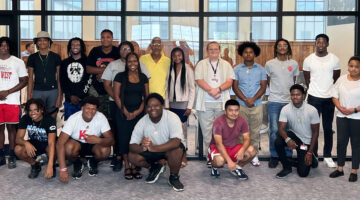
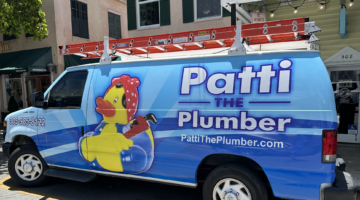
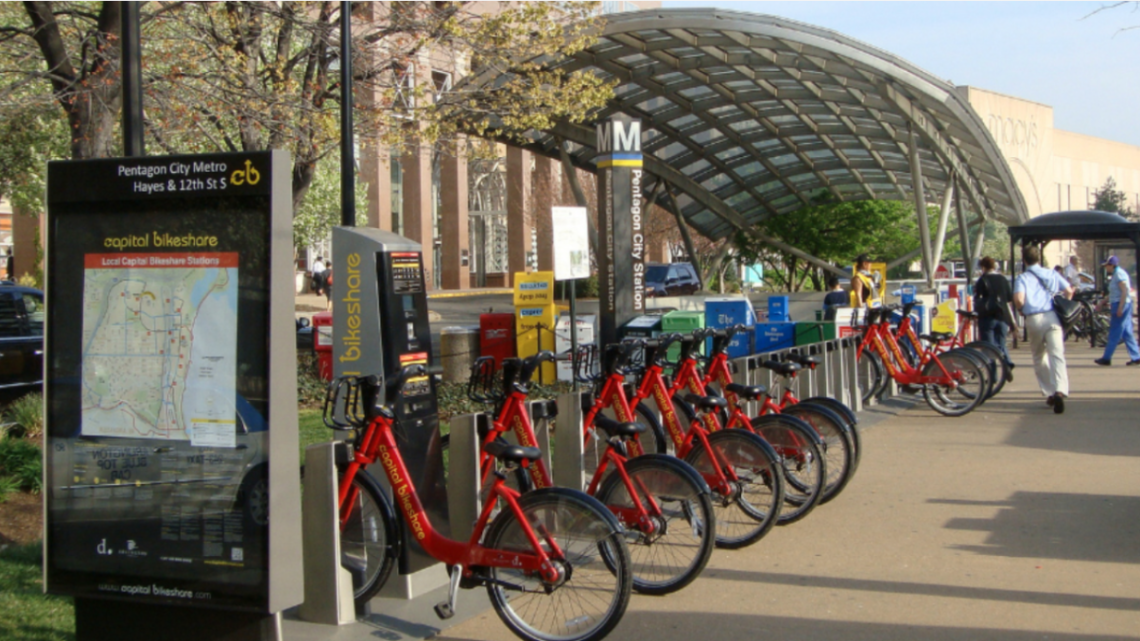
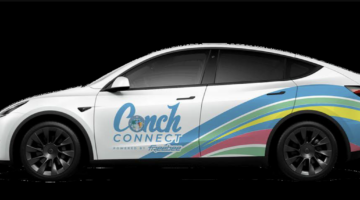
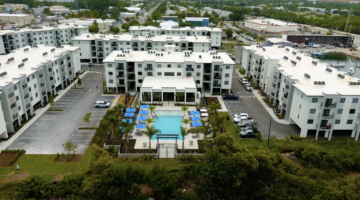
No Comment